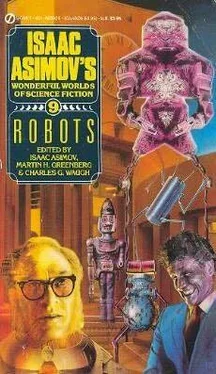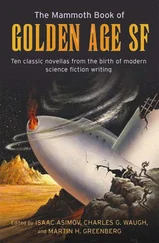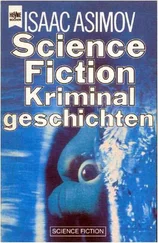Frederik Pohl - Isaac Asimov's Worlds of Science Fiction. Book 9 - Robots
Здесь есть возможность читать онлайн «Frederik Pohl - Isaac Asimov's Worlds of Science Fiction. Book 9 - Robots» весь текст электронной книги совершенно бесплатно (целиком полную версию без сокращений). В некоторых случаях можно слушать аудио, скачать через торрент в формате fb2 и присутствует краткое содержание. Год выпуска: 1989, ISBN: 1989, Издательство: Robinson Publishing, Жанр: Фантастика и фэнтези, на английском языке. Описание произведения, (предисловие) а так же отзывы посетителей доступны на портале библиотеки ЛибКат.
- Название:Isaac Asimov's Worlds of Science Fiction. Book 9: Robots
- Автор:
- Издательство:Robinson Publishing
- Жанр:
- Год:1989
- ISBN:ISBN: 1-85487-041-6
- Рейтинг книги:4 / 5. Голосов: 1
-
Избранное:Добавить в избранное
- Отзывы:
-
Ваша оценка:
- 80
- 1
- 2
- 3
- 4
- 5
Isaac Asimov's Worlds of Science Fiction. Book 9: Robots: краткое содержание, описание и аннотация
Предлагаем к чтению аннотацию, описание, краткое содержание или предисловие (зависит от того, что написал сам автор книги «Isaac Asimov's Worlds of Science Fiction. Book 9: Robots»). Если вы не нашли необходимую информацию о книге — напишите в комментариях, мы постараемся отыскать её.
Isaac Asimov's Worlds of Science Fiction. Book 9: Robots — читать онлайн бесплатно полную книгу (весь текст) целиком
Ниже представлен текст книги, разбитый по страницам. Система сохранения места последней прочитанной страницы, позволяет с удобством читать онлайн бесплатно книгу «Isaac Asimov's Worlds of Science Fiction. Book 9: Robots», без необходимости каждый раз заново искать на чём Вы остановились. Поставьте закладку, и сможете в любой момент перейти на страницу, на которой закончили чтение.
Интервал:
Закладка:
Dylan crawled painfully behind a rock, his left arm useless. The silence had come back again and he waited, but neither of the Alien things moved. Nothing else moved in the woods around him. He turned his face up to the falling snow and let it come soothingly upon the awful wound in his side.
After a while he looked out at the monkey. It had risen to a sitting position but was frozen in the motion of rising. It had ceased to function when he hit the lump. Out of the numbness and the pain he felt a great gladness rising.
The guide. He had killed the guide.
He would not be cautious any more. Maybe some of the other robots were self-directing and dangerous, but they could be handled. He went to the lump, stared at it without feeling. A black, doughy bulge was swelling out through one of the holes.
It was too big to carry, but he would have to take something back. He went over and took the monkey by a stiff jutting arm and began dragging it back toward the village.
Now he began to stumble. It was dark and he was very tired. But the steel he had been forging in his breast was complete, and the days which were coming would be days full of living. He would walk with big shoulders and he would not bother to question, because man was not born to live out his days at home, by the fire.
It was a very big thing that Dylan had learned and he could not express it, but he knew it all the same, knew it beyond understanding. And so he went home to his people.
One by one, increasing, in the wee black corner of space which man had taken for his own, other men were learning. And the snow fell and the planets whirled; and when it was spring where Dylan had fought, men were already leaping back out to the stars.
Farewell To The Master
by Harry Bates
1
From his perch high on the ladder above the museum floor, Cliff Sutherland studied carefully each line and shadow of the great robot, then turned and looked thoughtfully down at the rush of visitors come from all over the solar system to see Gnut and the traveler for themselves and to hear once again their amazing, tragic story.
He himself had come to feel an almost proprietary interest in the exhibit, and with some reason. He had been the only freelance picture reporter on the Capitol grounds when the visitors from the Unknown had arrived, and had obtained the first professional shots of the ship. He had witnessed at close hand every event of the next mad few days. He had thereafter photographed many times the eight-foot robot, the ship, and the beautiful slain ambassador, Klaatu, and his imposing tomb out in the center of the Tidal Basin, and, such was the continuing news value of the event to the billions of persons throughout habitable space, he was there now once more to get still other shots and, if possible, a new "angle."
This time he was after a picture which showed Gnut as weird and menacing. The shots he had taken the day before had not given quite the effect he wanted, and he hoped to get it today; but the light was not yet right and he had to wait for the afternoon to wane a little.
The last of the crowd admitted in the present group hurried in, exclaiming at the great pure green curves of the mysterious time-space traveler, then completely forgetting the ship at sight of the awesome figure and great head of the giant Gnut. Hinged robots of crude man-like appearance were familiar enough, but never had Earthling eyes lain on one like this. For Gnut had almost exactly the shape of a man-a giant, but a man-with greenish metal for man's covering flesh, and greenish metal for man's bulging muscles. Except for a loin cloth, he was nude. He stood like the powerful god of the machine of some undreamed-of scientific civilization, on his face a look of sullen brooding thought. Those who looked at him did not make jests or idle remarks, and those nearest him usually did not speak at all. His strange, internally illuminated red eyes were so set that every observer felt they were fixed on himself alone, and he engendered a feeling that he might at any moment step forward in anger and perform unimaginable deeds.
A slight rustling sound came from speakers hidden in the ceiling above, and at once the noises of the crowd lessened. The recorded lecture was about to be given. Cliff sighed. He knew the thing by heart; had even been present when the recording was made, and met the speaker, a young chap named Stillwell.
"Ladies and gentlemen," began a clear and well-modulated voice-but Cliff was no longer attending. The shadows in the hollows of Gnut's face and figure were deeper; it was almost time for his shot. He picked up and examined the proofs of the pictures he had taken the day before and compared them critically with the subject.
As he looked a wrinkle came to his brow. He had not noticed it before, but now, suddenly, he had the feeling that since yesterday something about Gnut was changed. The pose before him was the identical one in the photographs, every detail on comparison seemed the same, but nevertheless the feeling persisted. He took up his viewing glass and more carefully compared subject and photographs, line by line. And then he saw that there was a difference.
With sudden excitement, Cliff snapped two pictures at different exposures. He knew he should wait a little and take others, but he was so sure he had stumbled on an important mystery that he had to get going, and quickly folding his accessory equipment he descended the ladder and made his way out. Twenty minutes later, consumed with curiosity, he was developing the new shots in his hotel bedroom.
What Cliff saw when he compared the negatives taken yesterday and today caused his scalp to tingle. Here was a slant indeed! And apparently no one but he knew! Still, what he had discovered, though it would have made the front page of every paper in the solar system, was after all only a lead. The story, what really had happened, he knew no better than anyone else. It must be his job to find out.
And that meant he would have to secrete himself in the building and stay there all night. That very night; there was still time for him to get back before closing. He would take a small, very fast infrared camera that could see in the dark, and he would get the real picture and the story.
He snatched up the little camera, grabbed an aircab, and hurried back to the museum. The place was filled with another section of the ever-present queue, and the lecture was just ending. He thanked Heaven that his arrangement with the museum permitted him to go in and out at will.
He had already decided what to do. First he made his way to the "floating" guard and asked a single question, and anticipation broadened on his face as he heard the expected answer. The second thing was to find a spot where he would be safe from the eyes of the men who would close the floor for the night. There was only one possible place, the laboratory set up behind the ship. Boldly he showed his press credentials to the second guard, stationed at the partitioned passageway leading to it, stating that he had come to interview the scientists; and in a moment was at the laboratory door.
He had been there a number of times and knew the room well. It was a large area roughly partitioned off for the work of the scientists engaged in breaking their way into the ship and full of a confusion of massive and heavy objects-electric and hot-air ovens, carboys of chemicals, asbestos sheeting, compressors, basins, ladles, a microscope, and a great deal of smaller equipment common to a metallurgical laboratory. Three white-smocked men were deeply engrossed in an experiment at the far end. Cliff, waiting a good moment, slipped inside and hid himself under a table half buried with supplies. He felt reasonably safe from detection there. Very soon now the scientists would be going home for the night.
Читать дальшеИнтервал:
Закладка:
Похожие книги на «Isaac Asimov's Worlds of Science Fiction. Book 9: Robots»
Представляем Вашему вниманию похожие книги на «Isaac Asimov's Worlds of Science Fiction. Book 9: Robots» списком для выбора. Мы отобрали схожую по названию и смыслу литературу в надежде предоставить читателям больше вариантов отыскать новые, интересные, ещё непрочитанные произведения.
Обсуждение, отзывы о книге «Isaac Asimov's Worlds of Science Fiction. Book 9: Robots» и просто собственные мнения читателей. Оставьте ваши комментарии, напишите, что Вы думаете о произведении, его смысле или главных героях. Укажите что конкретно понравилось, а что нет, и почему Вы так считаете.









